The China-India Thaw
Substantial readouts from Beijing and New Delhi on Chinese Foreign Minister Wang Yi's recent meetings with Indian PM Modi, FM Jaishankar, and National Security Advisor Doval in India.
A few days after Fareed Zakaria lamented that the recent U.S. alienation of India has been the biggest foreign policy mistake of Trump 2.0 in his GPS on CNN and in the Washington Post, Chinese Foreign Minister Wang Yi just concluded his productive visit to New Delhi.
Below are the readouts from Beijing and New Delhi on the visit.
From China’s Foreign Ministry
List of Outcomes of the Meeting between the Foreign Ministers of India and China
On 18 August 2025, H.E. Mr. Wang Yi, Member of the Political Bureau of the Communist Party of China (CPC) Central Committee and Minister of Foreign Affairs of the People's Republic of China held bilateral talks with H.E. Dr. S.Jaishankar, External Affairs Minister of the Republic of India in New Delhi. The two sides had positive, constructive and forward-looking discussions on bilateral, regional and international issues of common interest and agreed on the following understandings and outcomes:
1.Both sides underscored that the strategic guidance of the leaders of India and China plays an irreplaceable and crucial role in the development of India-China relations. They agreed that a stable, cooperative and forward-looking bilateral relationship is in their mutual interest to realize their development potential fully. They further agreed that both sides should earnestly implement the important common understandings reached between the two leaders and promote the sustained, sound and steady development of India-China relations.
2.The Chinese side welcomed Indian Prime Minister Narendra Modi's attendance at the Shanghai Cooperation Organization (SCO) Summit to be held in Tianjin. The Indian side reaffirmed its full support to the Chinese SCO Presidency, and looked forward to a successful SCO Summit with fruitful outcomes.
3.Both sides agreed to support each other in hosting successful diplomatic events. The Chinese side will support India in hosting the 2026 BRICS Summit. The Indian side will support China in hosting the 2027 BRICS Summit.
4.Both sides agreed to explore and resume various official bilateral dialogue mechanisms and exchanges to enhance cooperation and address each other’s concerns and properly manage differences, including holding the Third Meeting of the India-China High-level Mechanism on People-to-People Exchanges in India in 2026.
5.Both sides agreed to continue supporting each other in holding events in 2025 to commemorate the 75th anniversary of the establishment of diplomatic relations between India and China.
6.Both sides agreed to resume direct flight connectivity between Chinese mainland and India at the earliest and finalize an updated Air Services Agreement. Both sides also agreed on the facilitation of visas to tourists, businesses, media and other visitors in both directions.
7.Both sides agreed to continue and further expand the scale of Indian pilgrimage to Mt. Kailash/Mount Gang Renpoche and Lake Manasarovar/Mapam Yun Tso in Xizang Autonomous Region of China in 2026.
8.Both sides agreed to facilitate trade and investment flows between the two countries through concrete measures.
9. Both sides agreed to jointly maintain peace and tranquility in the border areas through friendly consultations.
10.Both sides agreed to uphold multilateralism, enhance communication on major international and regional issues, maintain a rules-based multilateral trading system with the WTO at its core, and promote a multipolar world that safeguards the interest of developing countries.
Ten points of consensus for the 24th Round of Talks Between the Special Representatives of China and India on the Boundary Question
On August 19, 2025, the 24th Round of Talks Between the Special Representatives (SR) of China and India on the Boundary Question was held in New Delhi, India. The talks were co-chaired by H.E. Mr. Wang Yi, Special Representative of China, Member of the Political Bureau of the CPC Central Committee and Director of the Office of the Central Commission for Foreign Affairs, and H.E. Mr. Ajit Doval, Special Representative of India and National Security Advisor.
Under the strategic guidance of the leaders of the two countries and in a positive and constructive spirit, the two sides had a candid and in-depth exchange of views on the China-India boundary question, and reached ten points of consensus as follows:
1.Spoke positively of the progress made in the implementation of the important leader-level consensus in Kazan, and shared the view that peace and tranquility has been maintained in the China-India border areas since the 23rd Round of SR Talks.
2.The two sides reiterated the importance of maintaining peace and tranquility in the border areas, emphasized handling the issue properly through friendly consultations, to promote overall development of the China-India bilateral relationship.
3. Agreed on the need to take a political perspective of the overall bilateral relationship while seeking a fair, reasonable and mutually acceptable framework for settlement of the boundary question in accordance with the Agreement on Political Parameters and Guiding Principles for Settlement of the China-India Boundary Question signed in 2005.
4. Agreed to set up an Expert Group, under the Working Mechanism for Consultation and Coordination on the China-India border affairs (WMCC) framework, to explore Early Harvest of boundary delimitation on appropriate Sectors.
5. Agreed to set up a Working Group, under the WMCC framework, to advance effective border management in order to maintain peace and tranquility in the border areas.
6. Agreed to create General-Level Mechanisms in the Eastern and Middle Sectors, in addition to the existing General-Level Mechanism in the Western Sector, and hold the next round of General-Level Mechanism meeting in the Western Sector at an early date.
7. Agreed to use the border management mechanisms at diplomatic and military levels to carry forward the process of border management, and discuss de-escalation, beginning with the principles and modalities thereof.
8. Exchanged views on trans-border rivers cooperation and agreed to give full play to the role of the China-India Expert Level Mechanism on Trans-border Rivers and keep communication on the renewal of relevant MoUs. The Chinese side agreed to share hydrological information during emergency situations based on humanitarian considerations.
9. Agreed to re-open the three traditional border trading markets, namely Renqinggang-Changgu, Pulan-Gunji and Jiuba-Namgya.
10. Agreed to hold the 25th Round of SR Talks in China in 2026.
Indian Prime Minister Modi Meets with Wang Yi
On August 19, 2025 (local time), Indian Prime Minister Narendra Modi met with Wang Yi, Member of the Political Bureau of the CPC Central Committee and Director of the Office of the Central Commission for Foreign Affairs, at the Prime Minister’s Office in New Delhi.
Prime Minister Modi asked Wang Yi to convey his cordial greetings to President Xi Jinping and Premier Li Qiang. He expressed strong anticipation for visiting China to attend the upcoming Shanghai Cooperation Organization (SCO) Summit in Tianjin and for holding a meeting with President Xi Jinping. Modi said that India would give its full support to China in its role as the rotating chair of the SCO to ensure the summit’s complete success.
Modi noted that both India and China are ancient civilizations with a long history of friendly exchanges. He stressed that the leaders’ meeting in Kazan last October marked a turning point in improving and advancing bilateral relations. India and China, he said, are partners rather than rivals, sharing the common task of accelerating development. The two countries should enhance exchanges, deepen mutual understanding, and expand cooperation, so that the world can better perceive the enormous potential and bright prospects of India–China cooperation. He emphasized that both sides must prudently manage and handle border issues, and should not allow differences to become disputes.
Modi further said that this year marks the 75th anniversary of the establishment of diplomatic ties between India and China. The two sides should view bilateral relations from a long-term perspective, as the arrival of the “Asian Century” cannot be realized without India–China cooperation. Advancing together will contribute to global development and bring benefits to all humankind.
Wang Yi conveyed the cordial greetings of President Xi Jinping and Premier Li Qiang to Prime Minister Modi and warmly welcomed Modi to attend the SCO Tianjin Summit in China. Wang noted that the successful meeting between the two leaders in Kazan last October had steered China–India relations onto a new course of restarting and moving forward. He said that through earnest implementation of the important consensus reached between the leaders, the two sides had ushered bilateral relations into a new phase of improvement and development—an achievement that was hard-won and should be cherished. Wang explained that his current visit to India, at the invitation to attend the Special Representatives’ Meeting on the Boundary Question, was also intended to help prepare for upcoming high-level interactions.
Wang said that after comprehensive and in-depth communication, the two sides had reached new consensus. On bilateral relations, they agreed to restart dialogue mechanisms across various fields, deepen mutually beneficial cooperation, uphold multilateralism, jointly address global challenges, and oppose unilateral bullying. On boundary issues, they agreed to carry out normalized management, maintain peace and tranquility in border areas, properly handle sensitive points, and launch boundary demarcation negotiations in sectors where conditions are ripe.
Wang emphasized that China–India relations have experienced ups and downs, and the lessons learned from this process should be remembered. No matter the circumstances, both sides should adhere to the correct positioning of being partners, not rivals; manage differences prudently; and prevent the boundary question from affecting the broader bilateral relationship. Against the backdrop of the current international situation, the strategic significance of China–India relations has become more prominent, and the strategic value of China–India cooperation more evident. China will faithfully implement the important consensus of the two leaders, strengthen exchanges and cooperation across various fields, and promote the steady and sustained growth of bilateral relations, so as to better benefit the two peoples and enable the two great civilizations of China and India to make their due contribution to the progress of humankind.
During his visit, Wang Yi also held the Special Representatives’ Meeting on the Boundary Question with India’s National Security Advisor Ajit Doval, and held talks with External Affairs Minister Subrahmanyam Jaishankar.
Wang Yi Holds Talks with Indian External Affairs Minister Subrahmanyam Jaishankar
On August 18, 2025 local time, Member of the Political Bureau of the CPC Central Committee and Foreign Minister Wang Yi held talks with Indian External Affairs Minister Subrahmanyam Jaishankar in New Delhi.
Wang Yi stated that in today's world, unprecedented changes are unfolding at a faster pace, unilateralism and bullying acts are rampant, and free trade and the international order face severe challenges. On the occasion of the 80th anniversary of the founding of the United Nations, humanity has reached a critical crossroads in determining the direction of the future. As the two largest developing countries with a combined population of more than 2.8 billion, China and India should demonstrate a sense of global responsibility, act as major countries, set an example for developing countries in pursuit of strength through unity, and contribute to advancing a multipolar world and greater democracy in international relations.
Wang Yi said that the successful meeting between President Xi Jinping and Prime Minister Narendra Modi in Kazan has provided guidance for the resumption and a new start for China-India relations. Both sides have been earnestly implementing the common understandings reached by the leaders of the two countries, gradually resuming exchanges and dialogues at various levels, maintaining peace and tranquility in border areas, and enabling Indian pilgrims to resume their pilgrimages to the sacred mountains and lakes in China's Xizang. China-India relations are showing a positive trend toward returning to the main course of cooperation. This year marks the 75th anniversary of the establishment of diplomatic relations between China and India. Both sides should earnestly draw lessons from the past 75 years, form a correct strategic perception, view each other as partners and opportunities rather than rivals or threats, invest their valuable resources in development and revitalization, and explore right ways for neighboring major countries to get along with each other, which are characterized by mutual respect and trust, peaceful coexistence, pursuit of common development, and win-win cooperation.
Wang Yi emphasized that China is ready to uphold the principle of amity, sincerity, mutual benefit and inclusiveness and the vision of a shared future, and work with neighboring countries, including India, to build a peaceful, safe and secure, prosperous, beautiful and amicable home. China and India should remain confident, move in the same direction, avoid disruptions, expand cooperation, and consolidate the improvement momentum of bilateral relations, so that revitalization processes of the two great eastern civilizations can reinforce each other and achieve mutual success, providing the most needed certainty and stability for Asia and the world at large.
Subrahmanyam Jaishankar said that under the joint guidance of leaders of both countries, India-China relations have moved from the bottom and are continuously improving and developing, with exchanges and cooperation between the two sides across various fields moving toward normalization. He expressed gratitude to China for facilitating Indian pilgrims' visits to the sacred mountains and lakes in China's Xizang. It is crucial for India and China to improve their strategic perceptions of each other. As the two largest developing countries, both India and China uphold multilateralism and are committed to promoting a fair and balanced multi-polar world. The two countries should also jointly maintain the stability of the world economy. Stable, cooperative, and forward-looking India-China relations serve the interests of both countries. Taiwan is part of China. India is willing to take the 75th anniversary of the establishment of diplomatic relations between the two countries as an opportunity to deepen political mutual trust with China, strengthen mutually beneficial cooperation in economy, trade and other fields, enhance people-to-people and cultural exchanges, and jointly maintain peace and tranquility in border areas. India fully supports China in hosting the Shanghai Cooperation Organization Tianjin Summit and is willing to strengthen coordination and cooperation with China in BRICS and other multilateral mechanisms.
Both sides also exchanged views on international and regional issues of common interest and concern.
China and India Hold the 24th Special Representatives’ Meeting on the Boundary Question
On August 19, 2025 (local time), the 24th Special Representatives’ Meeting on the China–India Boundary Question was held in New Delhi. Wang Yi, Member of the Political Bureau of the CPC Central Committee and Director of the Office of the Central Commission for Foreign Affairs, attended as the Chinese Special Representative. Shri Ajit Doval, India’s National Security Advisor, attended as the Indian Special Representative. The two sides held comprehensive, in-depth, and productive discussions on the boundary question and on bilateral relations.
Wang Yi stated that the important consensus reached between President Xi Jinping and Prime Minister Narendra Modi during their meeting in Kazan had charted the course and provided impetus for improving China–India relations and for properly addressing the boundary question. Since the beginning of this year, bilateral relations have entered a track of steady development, and the situation along the border has continued to stabilize and improve. As two major neighboring countries and two major developing countries, China and India share common concepts and have extensive common interests. The natural state between two emerging powers, Wang said, should be one of mutual trust and mutual support. China attaches great importance to Prime Minister Modi’s upcoming visit to China to attend the Shanghai Cooperation Organization (SCO) Summit in Tianjin, and looks forward to India making a positive contribution to the success of the summit.
Wang emphasized that history and reality have repeatedly proven that the sound and stable development of China–India relations is in the fundamental interests of the two peoples and is also the common expectation of the broader developing world. Both sides, he said, should follow the strategic guidance of the two leaders, approach bilateral relations and the boundary question with the mindset of pursuing parallel progress, mutual promotion, and a virtuous cycle. Through dialogue and communication, they should enhance mutual trust, expand exchanges and cooperation, and work together to build consensus, clarify directions, and set goals in areas such as border management, boundary negotiations, and cross-border exchanges. This would help properly resolve specific issues, achieve further positive progress, and create favorable conditions for the continuous improvement and development of bilateral relations.
Doval said that the leaders’ meeting in Kazan marked a turning point in improving and developing India–China relations. He noted that mutual perceptions had undergone positive changes, peace and tranquility had been maintained in border areas, and the bilateral relationship had made breakthrough progress. Given today’s turbulent and uncertain international environment, India and China face a series of common challenges, making it all the more necessary to enhance understanding, deepen trust, and strengthen cooperation—something directly related to the well-being of the two peoples and to world peace and development. Doval reiterated that India has always adhered to the one-China policy. He highlighted that this year marks the 75th anniversary of diplomatic relations between India and China. Prime Minister Modi, he said, looks forward to attending the SCO Summit in Tianjin, confident that this will help push bilateral relations to new heights. India supports China, as the rotating chair, in hosting a successful summit. India is willing to maintain communication and dialogue with China in a positive and pragmatic spirit, and to steadily accumulate conditions for the final settlement of the boundary question.
The two sides exchanged views on possible early harvests in boundary negotiations, and reaffirmed that they will make full use of the Special Representatives’ Meeting mechanism. Guided by the political parameters and guiding principles agreed in 2005, and in a spirit of mutual respect and mutual understanding, they will explore a fair, reasonable, and mutually acceptable solution. At the same time, they will strengthen normalized management of the border and jointly safeguard peace and tranquility in the border areas. The two sides agreed that the 25th Special Representatives’ Meeting on the Boundary Question will be held next year in China.
The two sides also exchanged views on major international and regional issues of common concern.
From the Ministry of External Affairs of India
Chinese Foreign Minister Wang Yi calls-on PM Narendra Modi
August 19, 2025
Today, Prime Minister Shri Narendra Modi received Mr Wang Yi, Member of the Politburo of the Communist Party and Foreign Minister of China.
2. Mr. Wang Yi handed over message and invitation from President Xi to Prime Minister for the SCO Summit being held in Tianjin. He also shared his positive assessment of bilateral meeting with EAM Dr. S. Jaishankar and 24th Meeting of the Special Representatives, which he co-chaired with NSA Shri Ajit Doval during his visit.
3. Prime Minister emphasised the importance of maintaining peace and tranquillity on the border, and reiterated India's commitment to a fair, reasonable and mutually acceptable resolution of the boundary question.
4. Prime Minister welcomed the steady and positive progress in bilateral ties since his meeting with President Xi in Kazan last year, guided by mutual respect, mutual interest and mutual sensitivity, including the resumption of the Kailash Manasarovar Yatra.
5. Prime Minister thanked President Xi for the invitation to the SCO Summit and conveyed his acceptance. He expressed support for China's Presidency of the SCO Summit and said that he looked forward to meeting President Xi in Tianjin. PM underlined that stable, predictable, and constructive ties between India and China will contribute significantly to regional and global peace and prosperity.
New Delhi
August 19, 2025
Visit of Foreign Minister of China to India ( August 18-19, 2025)
August 19, 2025
At the invitation of National Security Adviser Shri Ajit Doval, member of the Political Bureau of the Communist Party of China Central Committee and Minister of Foreign Affairs of the People's Republic of China Mr. Wang Yi paid an official visit to India on 18-19 August 2025. Apart from co-chairing the 24th round of the Special Representatives' (SRs) Dialogue on the Boundary Question between India and China with the NSA, Foreign Minister Wang Yi also held bilateral talks with External Affairs Minister Dr. S. Jaishankar and called on Prime Minister Shri Narendra Modi.
2. Discussions in the SR talks covered issues related to de-escalation, delimitation and boundary affairs. Discussions between the Foreign Ministers covered bilateral, regional and international issues of common interest.
3. The Indian side strongly raised the issue of terrorism in all its forms and manifestations, including cross-border terrorism, recalling that one of the original objectives of the Shanghai Cooperation Organisation (SCO), whose summit will be held later this month in China, was to counter the evil of terrorism. Minister Wang Yi concurred that countering terrorism should be given the highest priority.
4. During the discussions, External Affairs Minister also underlined India's concerns with regard to the mega dam construction being undertaken by China in the lower reaches of the Yarlung Tsangpo (Brahmaputra river), which will have implications for lower riparian states. The need for utmost transparency in this regard was strongly underlined.
5. The Chinese side raised the issue of Taiwan. The Indian side underlined that there was no change in its position on this issue. It pointed out that, like the rest of the world, India had a relationship with Taiwan that focuses on economic, technological and cultural ties and that this would continue. The Indian side noted that China also cooperates with Taiwan in these very domains.
6. A document detailing the outcomes from the various meetings is being issued separately.
New Delhi
August 19, 2025
Visit of China's Foreign Minister and Special Representative on the India-China boundary question
August 19, 2025
At the invitation of the Special Representative and the National Security Advisor Shri Ajit Doval, the Member of the Political Bureau of the Communist Party of China (CPC) Central Committee and Minister of Foreign Affairs of the People’s Republic of China Mr. Wang Yi paid an official visit to India from 18-19 August 2025.
During his visit, Minister Wang co-chaired the 24th round of the Special Representatives’ dialogue on the Boundary Question between India and China with the National Security Advisor, Shri Ajit Doval on 19 August 2025, and held bilateral talks with External Affairs Minister Dr. S. Jaishankar on 18 August 2025. He also called on Prime Minister Narendra Modi on 19 August 2025.
The two sides spoke positively of the progress made in the implementation of the important leader-level consensus in Kazan. The two sides shared the view that peace & tranquility has been maintained in the India-China border areas since the 23rd SR Talks. They reiterated the importance of maintaining peace and tranquillity in the border areas to promote overall development of the India-China bilateral relationship.
Under the strategic guidance of the leaders of the two countries and in a positive and constructive spirit, the two sides had a candid and in-depth exchange of views on India-China boundary question, and the two SRs agreed on the following:
1. The need to take a political perspective of the overall bilateral relationship while seeking a fair, reasonable and mutually acceptable framework for settlement of the boundary question in accordance with the Agreement on Political Parameters and Guiding Principles for Settlement of the India-China Boundary Question signed in 2005.
2. Setting up an Expert Group, under the Working Mechanism for Consultation and Coordination on India-China Border Affairs (WMCC), to explore Early Harvest in boundary delimitation in the India-China border areas;
3. Setting up a Working Group, under the WMCC, to advance effective border management in order to maintain peace and tranquillity in India-China border areas
4. Creation of General Level Mechanisms in Eastern, and Middle Sectors, in addition to the existing General Level Mechanism in Western Sector, and holding an early meeting of the General Level Mechanism in the Western Sector.
5. Use the border management mechanisms at diplomatic and military levels to carry forward the process of border management, and discuss de-escalation, beginning with the principles and modalities thereof.
The two sides also agreed to hold the next round of the SR Talks in China at a mutually convenient time.
In the meeting with the External Affairs Minister, the two sides had positive, constructive and forward-looking discussions on bilateral, regional and international issues of common interest and agreed on the following understandings and outcomes/practical steps on people-centric and economic engagement:
1. Both sides underscored that the strategic guidance of the leaders of India and China plays an irreplaceable and crucial role in the development on India-China relations. They agreed that a stable, cooperative and forward-looking relationship between India and China is in the mutual interest of the two countries to realize their development potential fully. They further agreed that both sides should earnestly implement the important common understandings reached between the two leaders and promote sustained, sound and steady development of India-China relations.
2. Chinese side welcomed Indian Prime Minister Narendra Modi’s attendance at the Shanghai Cooperation Organization (SCO) Summit to be held in Tianjin. Indian side reaffirmed its full support to China’s SCO Presidency, and looked forward to a successful SCO Summit with fruitful outcomes.
3. Both sides agreed to support each other in hosting successful diplomatic events. Chinese side will support India in hosting the 2026 BRICS Summit. Indian side will support China in hosting the 2027 BRICS Summit.
4. Both sides agreed to explore and resume various official bilateral dialogue mechanisms and exchanges, to enhance cooperation and address each other’s concerns and properly manage differences, including holding the Third Meeting of the India-China High-level Mechanism on People-to-People Exchanges in India in 2026.
5. Both sides agreed to continue supporting each other in holding events in 2025 to commemorate the 75th anniversary of the establishment of diplomatic relations between India and China.
6. Both sides agreed to resume direct flight connectivity between Chinese mainland and India at the earliest, and finalize an updated Air Services Agreement. They also agreed on the facilitation of visas to tourists, businesses, media and other visitors in both directions
7. Both sides agreed to continue and further expand the scale of the Indian pilgrimage to Mt. Kailash/ Gang Renpoche and Lake Manasarovar / Mapam Yun Tso in Tibet Autonomous Region of China starting 2026.
8. The two sides exchanged views on trans-border rivers cooperation and agreed to give full play to the role of India-China Expert Level Mechanism on Trans-border Rivers and keep communication on renewal of the relevant MoUs. The Chinese side agreed to share hydrological information during emergency situations based on humanitarian considerations.
9. Both sides agreed to the re-opening of border trade through the three designated trading points, namely Lipulekh Pass, Shipki La Pass and Nathu La Pass.
10. Both sides agreed to facilitate trade and investment flows between the two countries through concrete measures.
11. Both sides agreed to jointly maintain peace and tranquility in the border areas through friendly consultations.
12. Both sides agreed to uphold multilateralism, enhance communication major international and regional issues, maintain a rules-based multilateral trading system with WTO at its core, and promote a multipolar world, that safeguards the interest of developing countries.
New Delhi
August 19, 2025


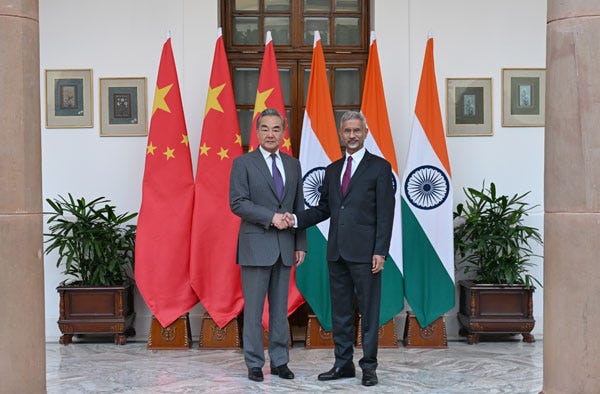
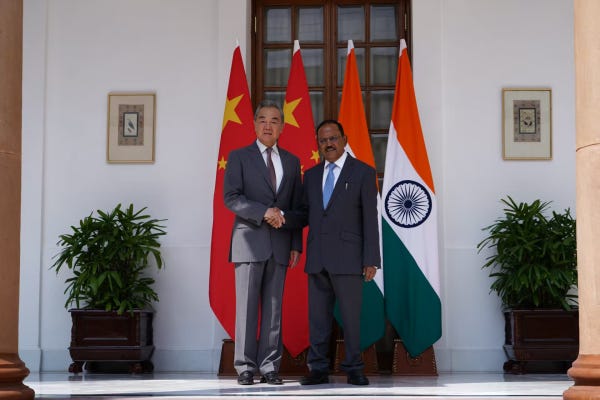
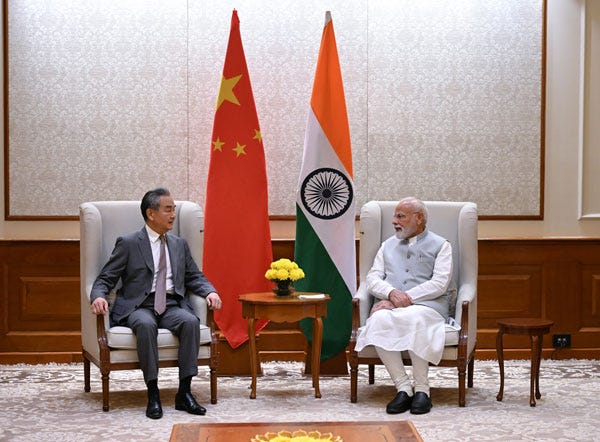
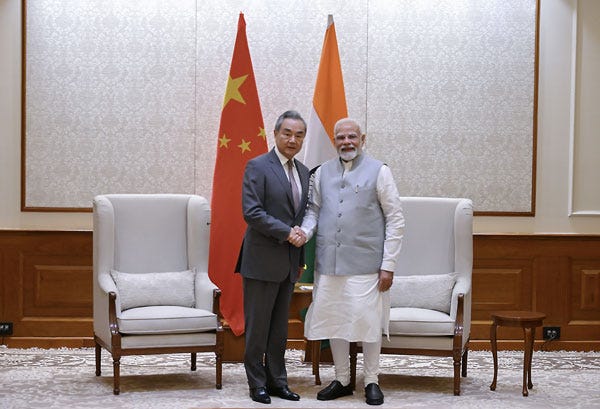
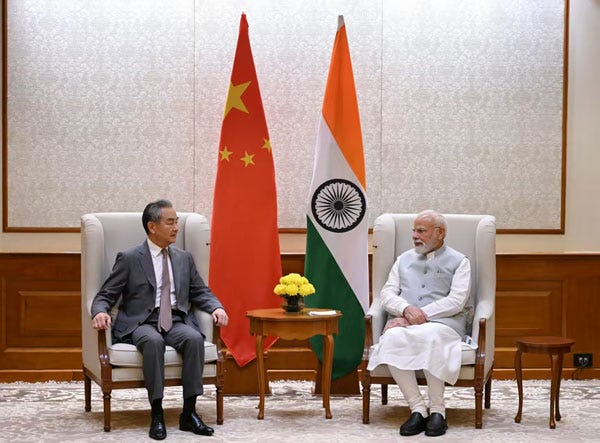
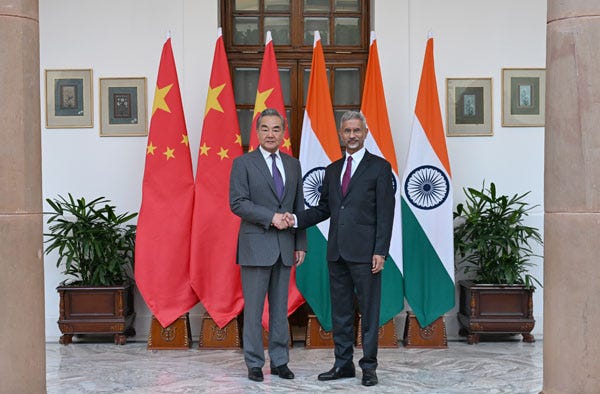
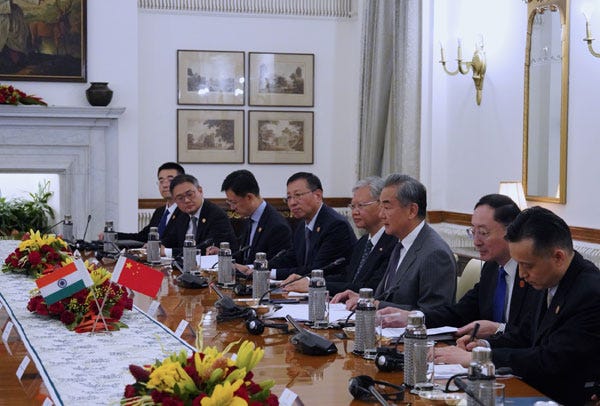
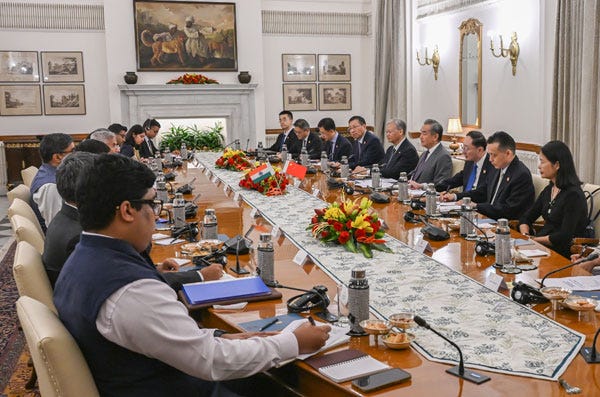
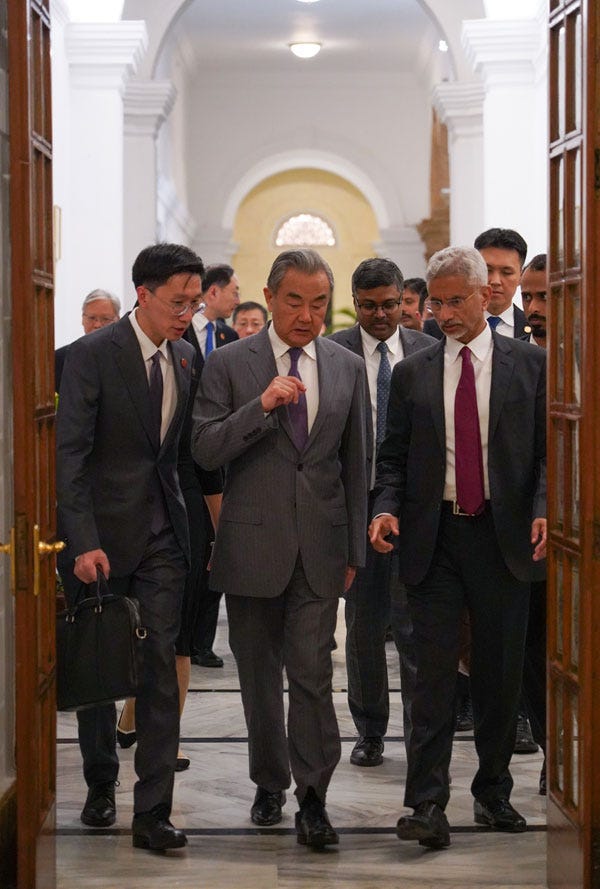
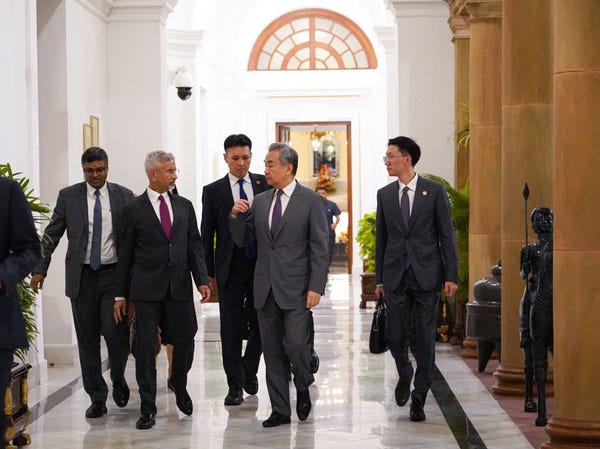
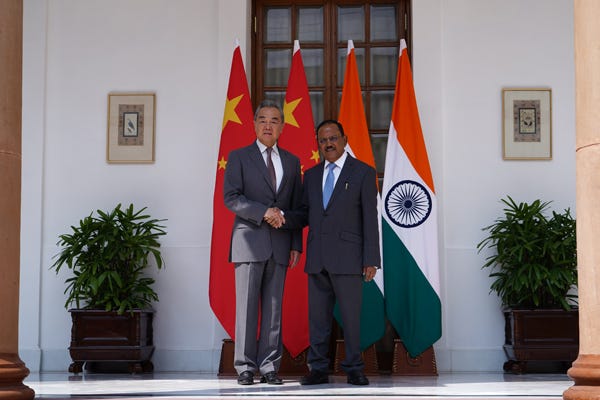
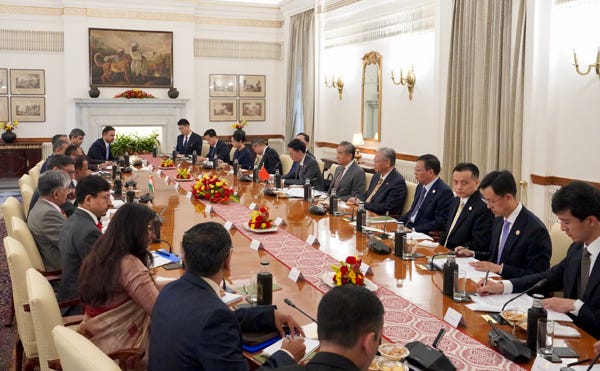
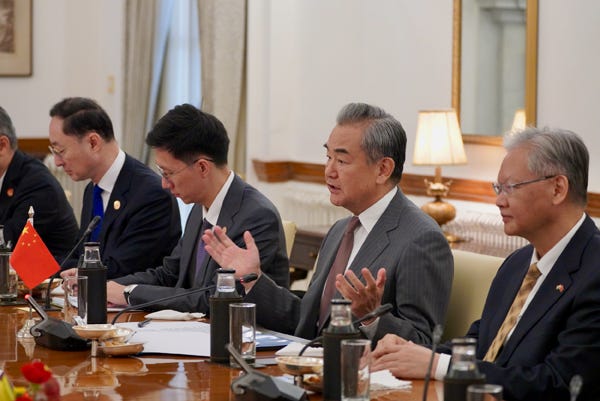
Any thaw between India and China has to be set against precedent: decades of Sino-Russian hostility, deeper and more violent, yet set aside for the foreseeable future. The India–China conflict is narrower, but Tibet locks in the asymmetry. Beijing controls Himalayan headwaters and high-altitude radar; with satellite guidance added, the imbalance is built into the map and cannot be overcome or negotiated away. India’s only option is accommodation, as Russia has already done—without the same risks.
Modi’s business constituency has pressed for a thaw for years, ruled by profit, not strategy. Unlike other elite enthusiasms, this one carries wider consequences: large-scale employment, urbanisation, even poverty relief all require Chinese inputs at industrial scale. No other economy has either the capacity or the experience.
Beijing is no naval threat in the Indian Ocean: with dependence on West Asian oil declining, the prohibitive cost of projecting power from its own shores leaves it without appetite, its attention fixed instead on securing food flows from South America across the Pacific, via corridors from Peru to Brazil. Should it ever attempt control in the medium term, it would confront a United States without the economic base to sustain dominance at that scale, notwithstanding AI-driven hype and quixotic attempts at reindustrialisation; that Delhi should chase an American alliance on this basis baffles.
Silicon Valley and Wall Street’s Indian-American grandees, once boosters of the U.S. connection, have largely drifted off, secured by asset hoards and Ivy League passage for their offspring.
With the commanding strata of the diaspora largely uninterested, the U.S.–India connection survives only as a vanity project. India’s foreign-policy cadre, backed by its American fixers—second-rate academics and journalists who built careers repeating Washington’s catechism—will work to obstruct any rapprochement with China. What remains is a policy in the hands of a narrow segment of the elite, weak and insecure, without a popular base, buttressed only by a degraded English-language media ruled by clicks and eyeballs, craving a prestige invisible abroad and useless at home.